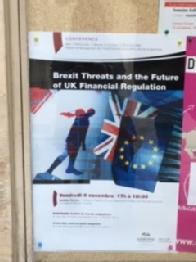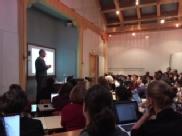Activities and Outputs
Paper delivered to the Virtual Paris Workshop on Reading Economics as Political Theory
On September 24th 2021 I presented a paper called 'The Political Context for Ricardo's Free Market Models' at the virtual Paris workshop on Reading Economics as Political Theory. The workshop was organised by Sam Knafo, Oliver Kessler and Matthias Thiemann.
Abstract: When attention turns to the need to read economics as political theory, one question tends to dominate. Out of all possible institutional arrangements for organising economic life, how did orthodox economic theory come to reflect in its models only free market institutions to the exclusion of all others? The search for the origins of this way of thinking usually alights on Ricardo’s Principles of Political Economy. However, precious little scholarship has thus far been conducted on the broader background conditions that shaped the way in which Ricardo presented his text. Further exploration of these conditions makes it possible to ask whether orthodox economic theory’s continued conflation of ‘the economy’ and ‘the market’ results from treating as if they were universal what were actually only the specific features of a strictly limited period of early nineteenth-century British political history. Ricardo wrote the Principles during the time at which civil liberties in the realm of free speech were severely curtailed in Britain by repeated repressive legislation that culminated in the so-called Six Acts. These acts made criticism of the King and his ministers into an offence with serious consequences, not least because they were backed by suspensions of habeas corpus that allowed religious dissenters and political radicals to be imprisoned without trial. Ricardo was shielded by parliamentary privilege when speaking out in the House of Commons against the broader political climate that had produced this legislation, but not when committing his economic theory to the page. I ask in this paper whether he sought refuge from such pressures in abstract models that were at one stage removed from an expressly articulated opinion, models that imposed a rigid separation between ‘state’ and ‘market’. He thus might be seen to have circumvented what proved to be time-limited sedition laws through escape into a free-floating realm called ‘the market’, but that realm has persisted in orthodox economic theory long after the original need for it was exhausted.
Presentation at Université Sorbonne Nouvelle, Paris 3



On 9th November 2018 I delivered a talk at the Institut du Monde Anglophone at the Université Sorbonne Nouvelle Paris 3. The talk was entitled, 'Brexit Threats and the Future of UK Financial Regulation'. The paper was designed to show in how many different directions the Conservative Party was pulling itself at that time over what to do about Brexit and how the City of London would fit into the post-Brexit global financial landscape. Global financial markets will inevitably be remade once Brexit frees the City from regulatory oversight from the European Commission, and the best bet at the time of delivering the presentation was that this would be in response to the City increasingly incorporating itself within the type of minimalist regulation usually associated with offshore financial centres. The paper was delivered one week before Theresa May presented her withdrawal agreement to a fractious Cabinet and an even more fractious Parliament, and at that time two potential models of the new regulatory future were still being discussed. One was the so-called Jersey Model, in which the UK would continue to follow EU rules for the trade in goods but not for the trade in services. The other was the so-called Singapore-on-Thames Model, in which a free-wheeling 'Global Britain' would seek to gain competitive advantage through regulatory undercutting. Both models seemed to me to point in the same direction when it comes to the question of how the City would in future be inserted into global financial markets. Both appeared to point to the British financial services industry being compensated for the loss of passporting rights within the EU financial space by being allowed pretty much to write its own regulatory system.
